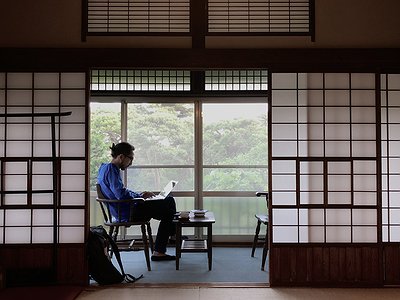Name: Shintaro Haioka
Occupation: Composer, producer, live performer
Nationality: Japanese
Current release: Haioka's new album Aru is available via Emerald & Doreen.
Recommendations: Mmm … It’s too difficult. Because I have a lot of recommendations. If I must choose 2 pieces, one would be the book “Wind, Sand and Stars (Terre des hommes)” by Antoine de Saint-Exupery. Known as the author of “The Little Prince”, this work, written based on his experiences as an airplane pilot, may serve as a reference for what artists of today should do and think. It gave me a lot to think about.
And another one is Japanese animation film “Ongaku (music)”. This 70-minute animation, released in 2020, took seven years to complete and was written entirely by hand. It has a rich expression of the impulses we had when we were young.
If you enjoyed this interview with Haioka and would like to know more, we recommend his official homepage as a point of departure. He is also on Soundcloud, twitter, Instagram, and Facebook.
When did you start writing/producing music - and what or who were your early passions and influences? What was it about music and/or sound that drew you to it?
Around 2000, electronic music, especially techno music got me very excited. I felt a sense of freedom, a sense of experimentation, a sense of borderlessness and a sense of a kind of music that offers pleasure beyond languages. Underworld, WESTBAM, Chemical Brothers, Daft Punk, and Japanese DJs like Takkyu Ishino and KAGAMI taught me that.
However, I was shy and grew up in a slightly conservative family. And at that time, techno was a very underground music in Japan. So for a while, I couldn't do anything creative with my passion.
In 2003, techno music was still underground in Japan. But the Japanese techno-pop band OVERROCKET inspired me. I started to make simple techno music with female vocals to introduce my friends and other people to techno. At that time in Japan, instrumental music still was not well understood. So, vocals were key.
But actually, the big reason was that I felt like I wanted to add records I'd made by myself to a growing collection of new releases. I would have liked to become a part of music history.
For most artists, originality is preceded by a phase of learning and, often, emulating others. What was this like for you: How would you describe your own development as an artist and the transition towards your own voice?
Techno music is defined by the "four to the floor" pattern. So, during my learning- and emulating phase, I used simple rhythm machines and synthesizers. (Of course, the more I studied, the more I realized that it's not simply a matter of creating a four-four-beat.)
But the problem was my inner longing for rock music. Though I wasn't able to play an instrument, I was listening to a lot of rock music besides techno. My best friend who I was making music with at the time and Japanese DJs really knew a lot of music and were true evangelists. The smashing pumpkins, U2, MONO, Depeche Mode, The Stone Roses, Sigur Rós, Boom Boom Satellites, etc.
[Read our Birgir Jón Birgisson interview, the long-time producer of Sigur Rós]
I had a longing for so many rock bands, too numerous to count. For shouts, loud or delicate guitars, and an intense, beautiful, sentimental atmosphere. So I focused on how to describe these very impulses and emotions with electronic music instruments.
I used a synthesizer to emulate the guitars of Jonny Greenwood or James Iha, and a drum machine to emulate the drums of Charlie Watts or Questlove. I believed it would help me to create my own originality. I still do.
How do you feel your sense of identity influences your creativity?
I am a Japanese living in Tokyo. As I said, I grew up in a typical, somewhat conservative family in Japan. Although I was sociable in general, I was actually a bit shy. Sometimes I worried about what people would think of me - a dreamer who likes fantasy, science fiction, anime and manga, and who's also a bit lazy. It affected my creativity 100%.
Japan is made up almost entirely of a single ethnic group, and because of this, most people tend to be nervous about what the world thinks of them, and want to categorize people into something. It looks closed. Because of the inadequacy of English education, there are still language differences, the Internet is no help for it.
So, we are the super majority in our own country, but once we step out of our country, we become the super minority with a different language and culture in the world. Therefore, when I come into contact with the wide world outside, as I do now. I sometimes feel as if my world is expanding but my hometown is closed and I feel that I have no place where I belong - like a piece of debris floating in space.
My creativity is like the dream of debris floating in zero gravity.
What were your main creative challenges in the beginning and how have they changed over time?
In the beginning, my creativity was inspired by my grandmother's modest life, who cherished the seasonal habits of Japan.I tried to express the daily lives of such people by music. Vividly, a little flatly, and with an awareness of space, just like ukiyo-e which is a traditional Japanese painting.
Also western paintings which were inspired by Ukiyo-e gave me inspirations. Especially the Impressionists. So, in my music, I tried to mix the modern with the classical, such as Edouard Manet's "Lunch on the Grass” (It's said that it’s a reworking of Giorgione's “The Pastoral Concert" in which Manet tried to combine the classical with the modern). It was a mix of modern electronic sounds and traditional Japanese sounds.
However, during the global viral crisis and the long time of having to stay at home, my interests became more microscopic: my country, my region, my life …. I focused on the lives of people within a 5km radius of where I live. (On my Instagram, there is a collection of the field-recording sounds that were the sources of my ideas.) Over time, I began to focus on expressing in sound what I saw and heard, the impressions of the mundane nature of people’s lives and the changing light coming through the windows, through the filter of my own inner feelings like Claude Monet did. It was like I was observing the world from a fixed point.
And due to these inspirations, I tried to incorporate the concept of brushstroke division into my music, technically. Especially, reading how artists translated their emotions and spirits through the touch of the brush was something that I found easy to relate to. Because the feeling is similar to Japanese traditional calligraphy.
Therefore I focused on the texture, intensity, and placement of the sounds so that listeners could feel the touch of sounds.
As creative goals and technical abilities change, so does the need for different tools of expression, be it instruments, software tools or recording equipment. Can you describe this path for you, starting from your first studio/first instrument? What motivated some of the choices you made in terms of instruments/tools/equipment over the years?
It’s a long story. It's all about me personally and my country, Japan as a whole.
Sure, I am attracted to instruments that I pay a lot of money for. However, I made no effort of getting that money. Friends would sell me instruments they didn't need at a discount. Or I bought equipment at a discount from a studio that was closing. Or bought them secondhand through online auctions. I also tried a lot of free software.
It's like my one belief. Why do I think so? It's meant to be a message to the people of my country, Japan. Japanese people have always loved technology and technical devices. Losing the war and trying to catch up with other countries has accelerated this. Most children are raised with the thoughts that the important thing is to be able to follow the example or do what they are taught. Because of this, they don’t know that there is a technology to express themselves. So, I guess they can't create something revolutionary and novel in Japan today. I want to sound the alarm.
And there's another reason. When I was young, I used to just listen to music, just enjoy it. So, I started with no knowledge of how to make music at all. I didn't even know any chords or notes. I didn't even know there was such a thing as dissonance. However, I was blessed with friends. They were kind enough to teach me how to make music. And I studied a lot by myself. I made a lot of immature music and played it for my friends. Then I got a lot of advice, and made music again, and again. What this means is that the quality of the equipment doesn't matter. What does matter is studying and developing a sense of style.
At the same time, I want to tell people that the path to creativity is open to everyone. I want to prove that even if you are a nobody and don't have expensive equipment, you can still be creative if you work hard. It is important to keep using the same instrument, to understand its characteristics, to know it deeply, and to develop a relationship with it to the point where it feels like a part of you. It's like a relationship with a lover.
That's why I still haven't updated my PC, it's still windows XP. Maybe I'm just lazy.
Have there been technologies or instruments which have profoundly changed or even questioned the way you make music?
The koto, which my grandmother gave me. It’s a traditional Japanese instrument, a unique stringed instrument. The chord structure is also unique to Japan. in addition to these, Japanese instruments are tuned according to the condition of the singer on that day.
When I use the instrument, I can feel the different sensibilities that have been passed down in Japan since ancient times: The Japanese sense of beauty, and the blood of my ancestors flowing within me. I can have the opportunity to talk with my ancestors about modern music. It's very spiritual.



